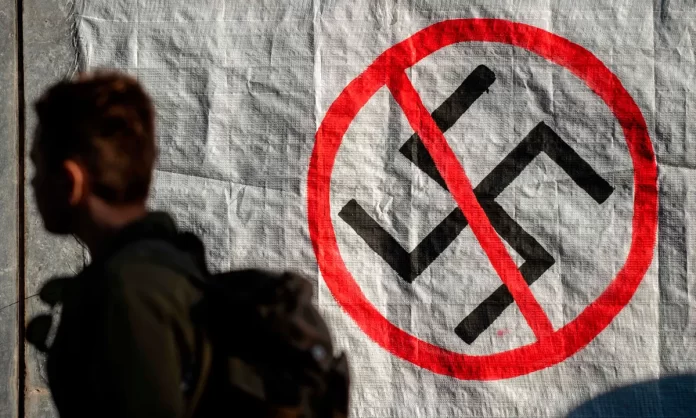This move comes in response to an increase in far-right activity within the country
Australian Attorney-General Mark Dreyfus announced on June 8 that the Australian government intended to introduce legislation to ban swastikas and other Nazi symbols nationwide. This move comes in response to an increase in far-right activity within the country, reported nriaffairs.com.
While several Australian states already have existing bans on such symbols, the proposed federal law would extend the prohibition to include the trading of Nazi-related materials. In an interview with Nine Network television, Dreyfus emphasised the need for a federal law to address the rising violent far-right activity, stating that he will be presenting the legislation to Parliament the following week.
He further highlighted the government’s responsibility for import and export, expressing a desire to put an end to the trading of Nazi memorabilia and any items bearing such symbols. Dreyfus concluded by emphasising that Australia should not tolerate the dissemination of hatred and violence within its borders.
The Australian House of Representatives, currently under the control of the Labour Party government, lacks control over the Senate, leaving the timeline for the passage and implementation of the proposed ban on Nazi symbols uncertain. The legislation aims to impose a penalty of up to one year in prison for individuals found displaying such symbols.
However, the law will incorporate certain exceptions, allowing for the display of these symbols for religious, educational, or artistic purposes. Notably, the ban will not impact the use of the swastika in Hinduism, Buddhism, and Jainism, as these religions observe the symbol in their practices.
Dreyfus, who is of Jewish heritage, acknowledged that the number of neo-Nazis in the country remains limited. However, he pointed out that the Australian Security Intelligence Organisation, the primary domestic intelligence agency, has expressed concerns about its activities over the past three years.
Dreyfus expressed hope that the number of individuals involved in such activities continues to diminish, eventually leading to their complete eradication, in an interview with the Australian Broadcasting Corp.
The decision to implement a ban on Nazi symbols in Australia comes in the wake of recent unsettling events that garnered international attention. Dreyfus expressed regret over the violent nature of certain public gatherings associated with these extremist individuals.
One notable incident occurred on May 13 in Melbourne, where a neo-Nazi group organised an anti-immigration rally at Victoria’s state parliament. Dressed in black attire, some participants concealed their faces while others brazenly smiled for cameras as they marched through the city. The far-right demonstrators clashed with counter-protesters advocating against fascism, leading to physical altercations.
Germany and Austria’s strict laws regarding the sale and display of Nazi-era symbols are widely recognised internationally. These regulations were largely influenced by the Allied victors of World War II and subsequently implemented by the postwar authorities in West Germany
During the rally, numerous participants brandished Australian flags and were observed making “Hitler salutes” as they progressed. Another incident took place in March, also in Melbourne, when neo-Nazis participated in an anti-trans rights rally. Outside the state parliament building, they performed Nazi salutes and engaged in confrontations with opposing protesters.
Regarding the issue of the Hitler salute, Dreyfus explained that the federal government of Australia is not the appropriate body to address it. Dreyfus emphasised that state governments hold greater responsibility when it comes to dealing with what could be deemed as street offences. He clarified that the federal law primarily focuses on public display, both offline and online while leaving the regulation of the salute to the states.
Dreyfus underlined that the overall plan is a coordinated effort among Australia’s states and territories. Each jurisdiction has either implemented laws or announced intentions to outlaw Nazi symbols. The proposed federal legislation aims to complement these state rules and ensure the absence of any exploitable loopholes.
One significant aspect of the planned federal law is the prohibition of the commercial sale of clothing, items, or memorabilia featuring Nazi symbols. Dreyfus emphasised that individuals engaging in such sales could face a prison sentence of up to one year. However, exceptions would be made for artistic, academic, or religious use. Notably, the swastika symbol holds historical significance in Hinduism, Jainism, and Buddhism predating its appropriation by the Nazis.
Germany and Austria’s strict laws regarding the sale and display of Nazi-era symbols are widely recognised internationally. These regulations were largely influenced by the Allied victors of World War II and subsequently implemented by the postwar authorities in West Germany.
While Germany and Austria are well-known for their comprehensive restrictions, similar albeit sometimes less extensive regulations exist in various countries worldwide, particularly in Europe. These include countries like France, Latvia, Ukraine, Russia, Poland, Lithuania, Hungary, and even Brazil. In several of these nations, restrictions apply to both Nazi and Soviet symbols. Australia is on the verge of making history as the first English-speaking country to introduce such laws.
*****************************************************
Readers
These are extraordinary times. All of us have to rely on high-impact, trustworthy journalism. And this is especially true of the Indian Diaspora. Members of the Indian community overseas cannot be fed with inaccurate news.
Pravasi Samwad is a venture that has no shareholders. It is the result of an impassioned initiative of a handful of Indian journalists spread around the world. We have taken the small step forward with the pledge to provide news with accuracy, free from political and commercial influence. Our aim is to keep you, our readers, informed about developments at ‘home’ and across the world that affect you.
Please help us to keep our journalism independent and free.
In these difficult times, to run a news website requires finances. While every contribution, big or small, will makes a difference, we request our readers to put us in touch with advertisers worldwide. It will be a great help.
For more information: pravasisamwad00@gmail.com



